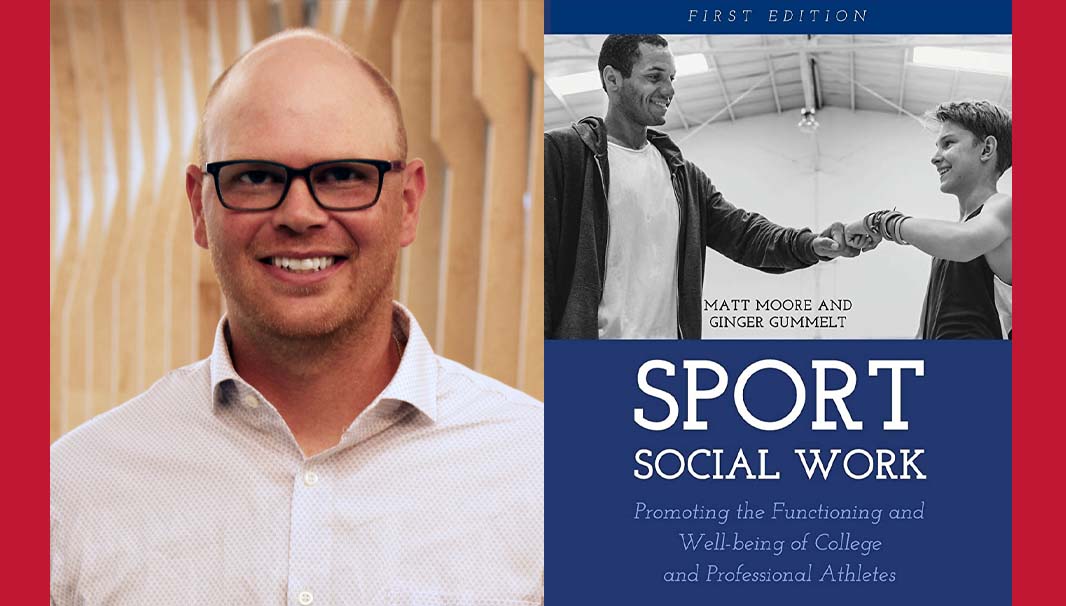Matt Moore named chair of Miami’s Family Science and Social Work department
Expertise combining sport and social work expands the horizons of a growing field

Matt Moore named chair of Miami’s Family Science and Social Work department
Speak to any social worker and you’ll quickly learn just how much the field and the profession actually encompass.
Alongside their support of children and families, social workers also help empower different individuals, groups, and communities all across society. They work in schools and hospitals, in correctional facilities and government organizations. They work with the elderly, military veterans, those living with disabilities, and more.
Matt Moore, who will serve as the incoming chair for Miami University’s Department of Family Science and Social Work (FSW), also has extensive experience working with another group, one not often traditionally associated with the field: College athletes.
“My area of interest is at the intersection between social work and athletics,” Moore said. “I was a college tennis player. And in addition to my academic role, I spent many of the last 17 years in competitive coaching positions at the collegiate level, and I have experienced the vulnerabilities facing athletes regarding mental and behavioral health, and a variety of other challenges.”
These challenges can include depression, mood disorders, disordered eating, and more. As an area of academic study, sport social work also advances research and advocates for policy change to mitigate some of these darker sides of sport.
And while there are some parallels with sport psychology, it differs in fundamental ways.
"Sport social work views sport from an ecological perspective. This can build upon the foundation of sport psychology and performance." Moore added, "It is important to not only explore factors at the individual or group level, it is equally important to explore how organizations and communities impact the world of sport as well."
It's also an area that has seen a tremendous amount of growth in the last decade, and Moore is counted among the top academics in the field today.
He co-authored the first text book, Sport Social Work: Promoting the Functioning and Well-being of College and Professional Athletes. He also co-founded the Alliance of Social Workers in Sports, and in 2021 he launched the Sport Social Work Journal, which is also the first peer reviewed publication to focus on athletics and social work.
“I’m excited to have Matt Moore join us as the next chair of the Department of Family Science and Social Work, and as a member of the college’s leadership team,” said Jason Lane, dean of Miami’s College of Education, Health, and Society. “The FSW department has made remarkable strides over the last several years and we are looking forward to the experience, creativity, and enthusiasm that Matt will bring to the department and the college as we continue to advance the field.”
Prior to accepting his new position at Miami, Moore earned degrees in psychology and philosophy before working as a case manager for the Department Child Services in Indiana, which inspired his continued interest in social work.
After completing his Ph.D. at Indiana University, Moore rose through the ranks as a faculty member at Ball State University, where he recently served as the social work department chair.
Moore will officially begin his role at Miami University beginning with the 2023 – 2024 academic year. This fall, he will take over from Miami FSW professor Katherine Kuvalanka, who previously served as interim department chair.
“I want to thank Kate Kuvalanka for her leadership of the department over the last three years,” Lane said. “She has worked tirelessly with the faculty to launch new initiatives, grow enrollments, and significantly increase external support for the department. I am deeply appreciative of her committed leadership and look forward to working with her in new capacities.”
As the new FSW department chair, Moore plans to focus on workforce development to increase the number of practitioners across the field, especially those from underrepresented groups. He also plans to expand and strengthen the inclusive excellence of Miami’s program by encouraging different perspectives and approaches to address some of society’s most pressing problems.